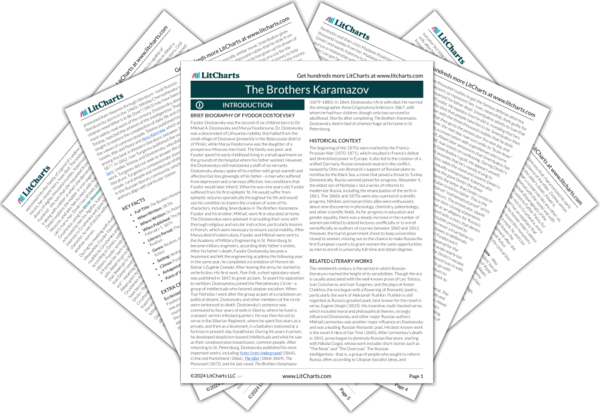Faith vs. Reason
The “accursed question” that hovers in the minds of Fyodor Dostoevsky’s central characters in The Brothers Karamazov is whether or not God exists. Furthermore, if God does exist, what is the moral meaning of this fact in a society that has increasingly less interest in religious faith? During his lifetime, Dostoevsky witnessed Russia veering toward socialism and worried that the political ideology’s rejection of divine faith would lead to moral decay. He also worried that…
read analysis of Faith vs. ReasonInnocence and Guilt
When Dmitri is arrested for his father Fyodor Pavlovich’s murder, there appears to be little doubt, even in the reader’s mind, that Dmitri is the likeliest culprit. Dmitri’s resentment of his father’s neglect during his childhood, Fyodor’s withholding of Dmitri’s land inheritance, and their rivalry for Grushenka’s affections all seem to confirm Dmitri’s motives for and guilt in committing parricide (the killing of one’s parent). When Ivan Fyodorovich learns that it is actually…
read analysis of Innocence and GuiltJealousy and Envy
In The Brothers Karamazov, jealousy serves as a major motivating factor for some of the main characters’ actions. Only Alexei, who has rejected sensuality in favor of communion with God, eludes this fatal weakness. Jealously partly explains Dmitri’s hatred of his father, Fyodor Pavlovich, who is his rival for Grushenka’s affections. Jealousy also causes Katerina Ivanovna’s resentment of Grushenka, due to Dmitri’s willingness to betray her in favor of…
read analysis of Jealousy and Envy
Morality and Modernization
During Dmitri Fyodorovich Karamazov’s trial for the murder of his father, Fyodor Pavlovich Karamazov, the prosecutor, Ippolit Kirillovich, uses the Karamazov clan’s intrigues as a cautionary tale against “modernizing Russia,” which he compares to a troika “galloping by at breakneck speed.” Russia is a nation that is rapidly progressing, but toward what? The country’s abdication of moral sense is, according to the prosecutor, making it “impossible for it to arrive at anything…
read analysis of Morality and ModernizationSuffering
Despite the wealth in which most of the main characters in The Brothers Karamazov live, they are too obsessed by feelings of jealousy, anger, and greed to enjoy their privileges. On the other hand, the characters who would evoke the most sympathy—Alexei Fyodorovich, his mother Sofia Ivanovna, “Stinking Lizaveta,” and Lise—seem to embrace suffering as a way of life. In the world that Dostoevsky has created for his characters, suffering…
read analysis of SufferingFamily
The Brothers Karamazov is rife with stories of dysfunction in families. Orphans, absent or negligent fathers, and financial ruin are commonplace. Dostoevsky strongly suggests that the family is the source of moral guidance, and that without said guidance, people are likely to become detriments to society. Thus, Fyodor Pavlovich’s failure to be a good parent is partly to blame for the downfall of his eldest son, Dmitri Fyodorovich, and for the mental breakdown…
read analysis of Family






